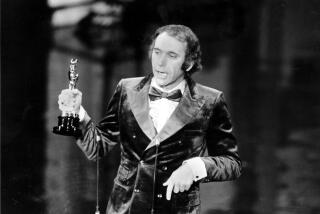Self-Made Movie Mogul Joseph E. Levine, 81, Dies
- Share via
Joseph E. Levine, the one-time Boston shoeshine boy who became a multimillionaire movie mogul with saturation screening and intense publicity campaigns, died Friday in Greenwich, Conn., where he had been ailing for several months. He was 81.
Levine had produced and/or distributed 498 motion pictures since the days, he noted in a recent interview, when “I used to hustle the back roads of New England as a small-time distributor.”
His name burst upon the picture business in 1959, when he paid $120,000 for the American rights to an Italian spear-and-sandal epic, “Hercules,” starring California weightlifter Steve Reeves.
Levine said the color in “Hercules,” which he called a “loincloth picture,” was poor and the Italians had botched the sound track--”but it had everything: muscle men, broads, and a shipwreck and a dragon for the kids.”
He put another $120,000 into dubbing dialogue, adding new sound effects and titles. Then he put more than $1 million into promotion and booked it into 600 theaters simultaneously. “Hercules” grossed more than $15 million.
Levine’s career ran the gamut. He brought the Japanese monster movie “Godzilla” to American film houses in 1956 but reached for quality in 1961 when he handled the U.S. distribution of the black-and-white Italian art film “Two Women,” starring Sophia Loren. It won Loren an Academy Award.
He backed Mike Nichols’ 1967 smash-hit directing debut, “The Graduate,” starring Dustin Hoffman, and produced such films as “The Lion in Winter” with Peter O’Toole and Katherine Hepburn (1968), “A Bridge Too Far” (1977) and “Magic” (1978).
His Embassy Films turned out “The Carpetbaggers” (1964), “Zulu” (1964), “Carnal Knowledge” (1971), “The Ruling Class” (1972) and “Day of the Dolphin” (1973). Levine gave Mel Brooks his start as a director with “The Producers” (1968), a script in which Brooks had been unable to interest other studios.
“The Graduate” was his biggest financial success, but “The Lion in Winter” was his favorite.
“I’ve made some good ones,” he said in 1974, upon stepping down as head of Avco-Embassy Co. to set up a streamlined production company, Joseph E. Levine Presents. “But I’ve made my share of lousy ones, too.”
Office in Manhattan
Just a few weeks ago, with his health failing but still able to be chauffeured in his limousine from his Louis XVI manor home in Greenwich to his Manhattan, N.Y., office above the Four Seasons (his favorite restaurant), Levine expressed to writer Donna Rosenthal his contempt for present-day producers:
“There’s too much Wall Street influence, guys who care only about making money. I love making money and I’m damn good at it, but I also love making pictures. I don’t consult banks or boards of directors. I’m still willing to pay millions for a feeling in my gut.”
The short (5 feet, 4 inches), immaculately dressed Levine had not made a movie since “Tattoo” in 1980, but he said he had nine scripts under option and was negotiating with Roger Moore and Michael Caine to make a film in Hong Kong.
Levine was born Sept. 9, 1905, in Boston. He was the youngest of six children of a Russian-Jewish immigrant tailor. After his father died and his mother’s second marriage failed, young Levine sold newspapers and shined shoes in the Boston slums. He quit school at 14 to work in a garment factory.
He became a traveling dress wholesaler, eventually managing to buy the regional rights to some old cowboy movies for $4,000. He became an exhibitor with four movie houses, and during World War II made $50,000 by buying the rights to “The Ravaged Earth,” a film about the Sino-Japanese War, and advertising it with unrestrained anti-Japanese fervor.
He bought “Godzilla” for a mere $12,000 in 1956, promoted it with $40,000 in borrowed money and grossed $1 million.
Then came “Hercules” and, eventually, “Hercules Unchained” (1960).
In the meantime, he outdid some of Hollywood’s more successful promotion and publicity experts. In 1960, he “rented” $1 million in cash from a Boston bank and showed the money at an exhibitors’ luncheon in New York City, telling them that it was going to be put to work promoting the film “Jack the Ripper,” a British crime film he had imported.
The exhibitors fell over each other signing up for the movie. Levine figured that the $5,000 it had cost him to borrow the cash for a few hours and haul it to New York by armored car bought him $1 million worth of publicity.
When a New York Times reviewer rapped his “Night Porter” in 1975, referring to it as “romantic pornography,” Levine simply plastered his advertising posters and billboards with that phrase, with some success.
In 1968, he sold Embassy to Avco Corp. for $40 million but remained as chief executive officer of Avco-Embassy. In 1974, he left to start Joseph E. Levine Presents.
‘I’m Not an Executive’
“I don’t like some of the things I’ve had to do here,” he said at the time. “I’m not an executive. I like to make pictures. I like to wheel and deal. I want to take it easy. I want to play around. I want to have my cake and eat it.”
And, he said, “I found that I just couldn’t spend anyone else’s money with the wild abandon that I spend my own. This is the time of the independent producer; a time made for me.”
Levine was a major collector of Andrew Wyeth paintings and helped establish a museum in Maine for the display of Wyeth art.
He leaves his wife, Rosalie, a former Rudy Vallee band singer he married in 1939; a son, Richard; a daughter Tricia, and two grandchildren.
Funeral services are scheduled for 2:30 p.m. Monday at Campbell Funeral Chapel in Manhattan. Burial will be in Hartsdale, N.Y.
More to Read
Only good movies
Get the Indie Focus newsletter, Mark Olsen's weekly guide to the world of cinema.
You may occasionally receive promotional content from the Los Angeles Times.









